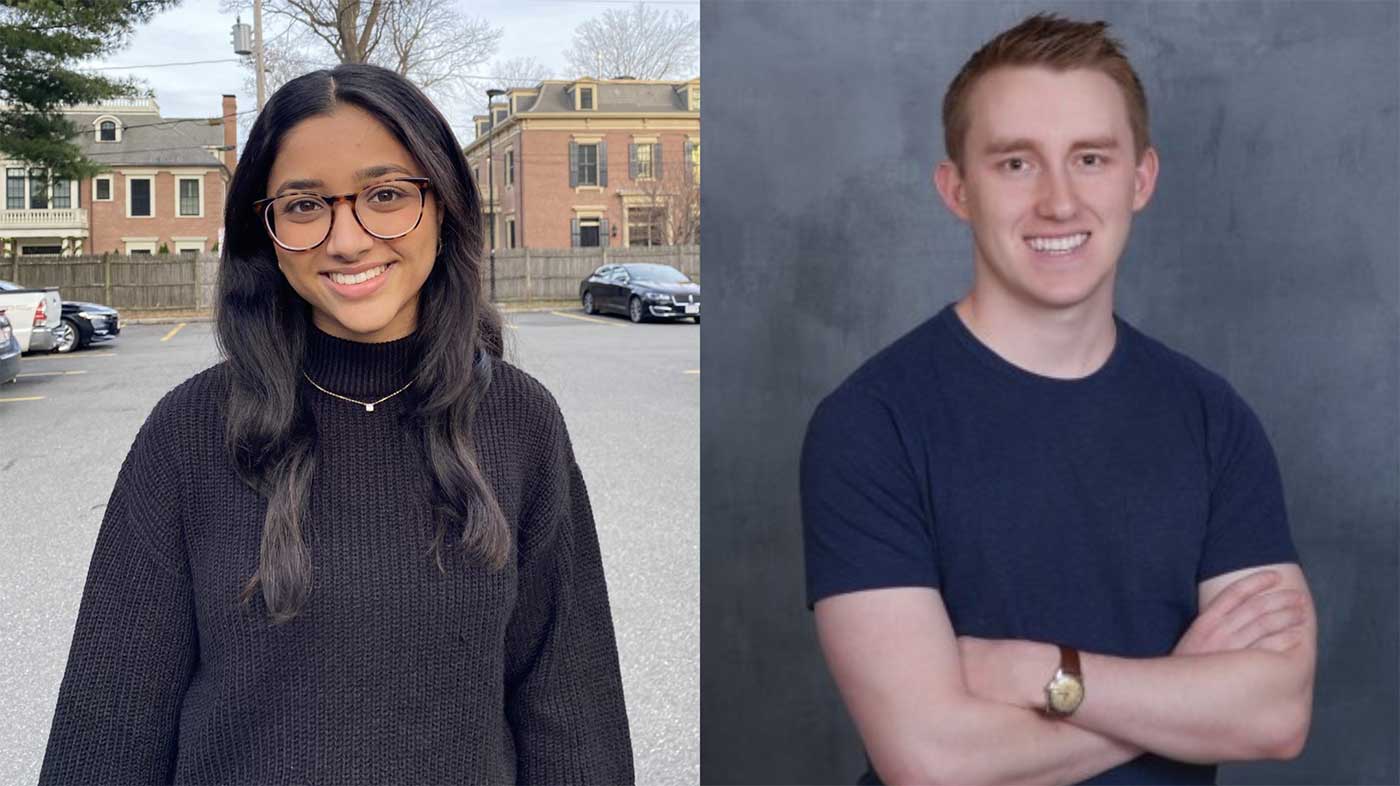Khoury News
At biotech startup Montai Health, co-ops leverage data to transform drug discovery
Want to land a co-op you love? Jake Ombach and Anika Das have some advice: take your class projects seriously. Das, a newly graduated data science and behavioral neuroscience combined […]

Want to land a co-op you love? Jake Ombach and Anika Das have some advice: take your class projects seriously.
Das, a newly graduated data science and behavioral neuroscience combined major, and Ombach, who just completed his data science master’s degree, landed their co-ops at Cambridge-based biotech startup Montai Health by utilizing the CS chops they’d developed building tools for books and basketball in their coursework.
“At the time of my Montai Health interview, in one of my classes, I was building an interactive visualization tool and book recommendation engine using JavaScript and the D3 library; Montai Health was really interested in that,” Das said. “During my first week on the job, they kept referring to me like ‘oh yeah, she knows all about D3’ and it gave me a lot of confidence. It was exciting to know that I had a skill they appreciated and wanted me to expand on.”
Ombach had demonstrated his supervised machine learning skills by creating a program to optimize basketball betting as a class project.
“Not every co-op has a biomedical or science background; they like having different perspectives,” said Ombach. “Regardless of your background, they want to know, ‘How are your critical thinking skills? How motivated are you?’”
Montai Health, a Cambridge-based biotech startup, regularly employs a number of Khoury co-ops on their data research team. The co-ops clean, analyze, and visualize data, and integrate new types of software to support the company’s mission to improve health outcomes and reduce the burden of chronic disease. They process both internally generated experimental data and externally generated data from biological and chemical databases, which helps Montai decide which molecules to further explore.
Montai is working to build what they call “the world’s first Anthromolecule Bioactivity Atlas,” a digital compound library of potentially therapeutic molecules found in food, supplements, and herbal medicines. Their tool is intended to speed drug discovery and development for diseases ranging from inflammatory to metabolic.
That mission was a big part of what attracted Das. Her background in behavioral neuroscience spurred curiosity with Montai’s research arm, even though she herself wasn’t conducting research. Instead, she spent a lot of her days creating data visualizations.
“As a data scientist or a computer scientist, you might initially feel removed from the science and research that’s going on in the lab, which is literally 10 feet away from you. But be curious about it,” Das recommended. “That kind of thinking trickles down to all parts of the company, and being curious and interested makes the job so much easier and more fun.”
As computer scientists, both Das and Ombach worked on Montai’s data innovation team, which is broken up into two sub-teams: platform engineering and data research. The platform engineering team primarily works to create the CS tools the company uses to sort and store data about different molecules and compounds, while the data research team works to extract information about those molecules from the data. The data innovation team works in concert with biology researchers performing lab science to create more data on the molecules Montai studies.
For Ombach, Montai’s culture was a big draw. From early in his co-op, he felt like he could talk to everyone from his manager up to the CEO, and everyone cared to hear what he had to say.
“Montai Health really values their employees and focuses on their mission to advance human health,” Ombach said. “There are always opportunities to pick people’s brains and to learn. They don’t want you doing work just to do work; they want you to grasp the why, the how.”
Das’s last co-op had been at a much larger company, and she didn’t feel her work had as much impact there as it did at a smaller, more interconnected enterprise like Montai. Armed with that knowledge, Das resolved to seek work at other small startups after graduating.
“(At Montai), I could see how the work I was doing was directly affecting other people in a positive way,” Das said. “I definitely felt more valued and important.”
Ombach continued to work part-time for Montai after his co-op ended last summer, moving from to the data research team and collaborating with new teams to extract meaning from Montai’s data. He’s now there full time.
“The best part of Montai is the flexibility and the ability to work on different projects,” Ombach said. “There are a lot of different areas of work that we do, and they’re very open to allowing you to explore different concepts and different types of work that can really expand your skill set.”
The Khoury Network: Be in the know
Subscribe now to our monthly newsletter for the latest stories and achievements of our students and faculty